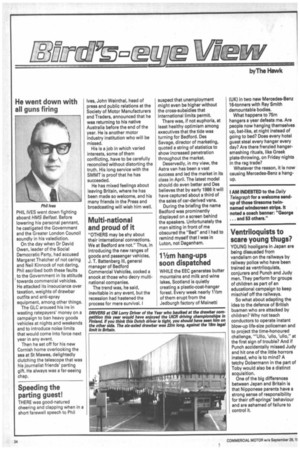byThe Hawk He went down with all guns firing
Page 26

If you've noticed an error in this article please click here to report it so we can fix it.
PHIL IVES went down fighting aboard HMS Belfast. Before lowering his personal pennant, he castigated the Government and the Greater London Council soundly in his valediction.
On the day when Dr David Owen, leader of the Social Democratic Party, had accused Margaret Thatcher of not caring and Neil Kinnock of not daring, Phil ascribed both these faults to the Government in its attitude towards commercial vehicles. He attacked its insouciance over taxation, weights of drawbar outfits and anti-spray equipment, among other things.
The GLC aroused his ire in wasting ratepayers' money on a campaign to ban heavy goods vehicles at nights and weekends and to introduce noise limits that would come into force next year in any event.
Then he set off for his new Cornish home overlooking the sea at St Mawes, delightedly clutching the telescope that was his journalist friends' parting gift. He always was a far-seeing chap.
Speeding the parting guest!
THERE was good-natured cheering and clapping when in a short farewell speech to Phil Ives, John Weinthal, head of press and public relations at the Society of Motor Manufacturers and Traders, announced that he was returning to his native Australia before the end of the year. He is another motor industry institution who will be missed.
His is a job in which varied interests, some of them conflicting, have to be carefully reconciled without distorting the truth. His long service with the SMMT is proof that he has succeeded.
He has mixed feelings about leaving Britain, where he has been made so welcome, and his many friends in the Press and broadcasting will wish him well.
Multi-national and proud of it
"OTHERS may be shy about their international connections. We at Bedford are not." Thus, in introducing the new ranges of goods and passenger vehicles, J. T. Battenberg III, general manager of Bedford Commercial Vehiclbs, cocked a snook at those who decry multinational companies.
The trend was, he said, inevitable in any event, but the recession had hastened the process for mere survival. I suspect that unemployment might even be higher without the cross-subsidies that international limits permit.
There was, if not euphoria, at least healthy optimism among executives that the tide was turning for Bedford. Des Savage, director of marketing, quoted a string of statistics to show increased penetration throughout the market.
Deservedly, in my view, the Astra van has been a vast success and led the market in its class in April. The latest model should do even better and Des believes that by early 1986 it will have captured about a third of the sales of car-derived vans.
During the briefing the name Bedford was prominently displayed on a screen behind the speakers. Unfortunately the man sitting in front of me obscured the "Bed" and I had to remind myself that I was in Luton, not Dagenham.
11/2m hang-ups soon dispatched
WHILE the EEC generates butter mountains and milk and wine lakes, Scotland is quietly creating a plastic-coat-hanger forest. Every week nearly 11/2m of them erupt from the Jedburgh factory of Mainetti
(UK) in two new Mercedes-Benz 16-tonners with Ray Smith demountable bodies.
What happens to 75m hangers a year defeats me. Are people now hanging themselves up, bat-like, at night instead of going to bed? Does every hotel guest steal every hanger every day? Are there frenzied hangersmashing rituals, like Greek plate-throwing, on Friday nights in the rag trade?
Whatever the reason, it is now causing Mercedes-Benz a hangup.
I AM INDEBTED to the Daily Telegraph for a welcome sendup of those tiresome twinnamed windscreen strips. It noted a coach banner: "George ... and 53 others."
Ventriloquists to scare young thugs?
YOUNG hooligans in Japan are being dissuaded from vandalism on the railways by railway police who have been trained as ventriloquists, conjurers and Punch and Judy men. They perform for groups of children as part of an educational campaign to keep mischief off the railways.
So what about adapting the idea to the defence of British busmen who are attacked by children? Why not teach conductors to operate instant blow-up life-size policemen and to project the time-honoured challenge, "Ullo, 'ullo, 'ullo," at the first sign of trouble? And if Punch accidentally missed Judy and hit one of the little horrors instead, who is to mind? A tetchy Dobermann in the part of Toby would also be a distinct acquisition.
One of the big differences between Japan and Britain is that Nipponese parents have a strong sense of responsibility for their off-springs' behaviour and are ashamed of failure to control it.
















































































































